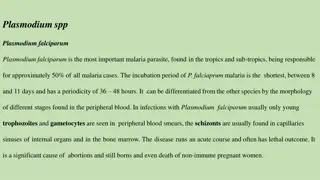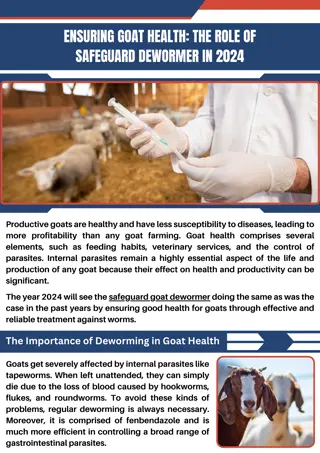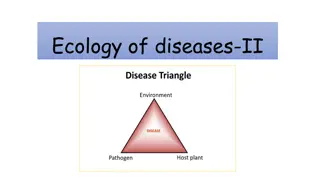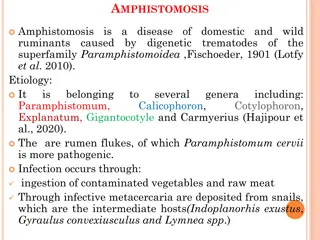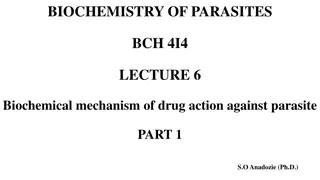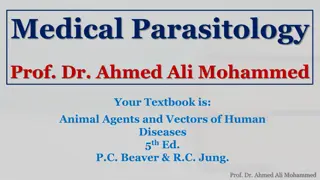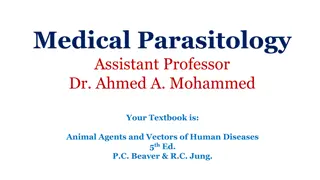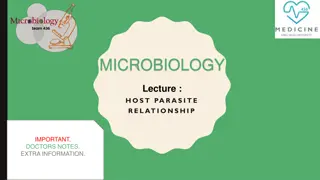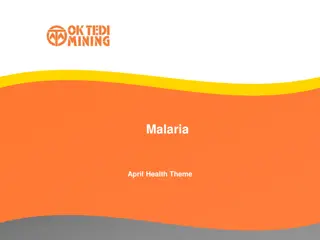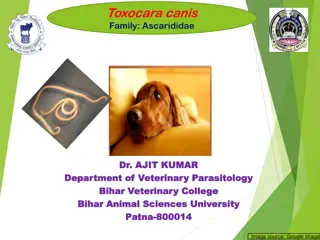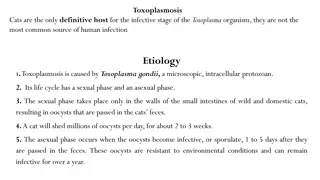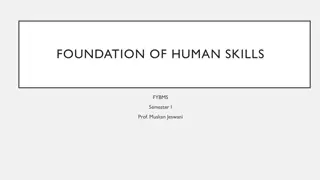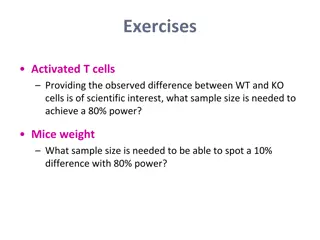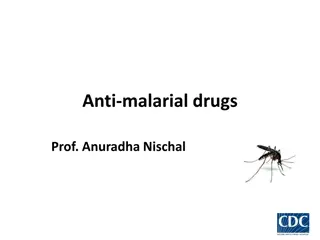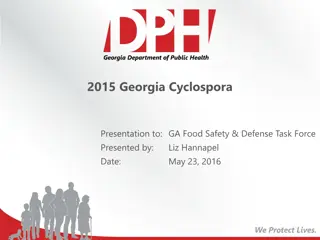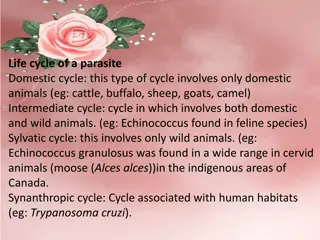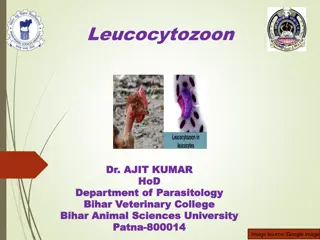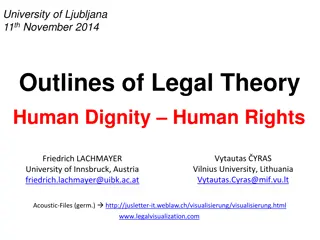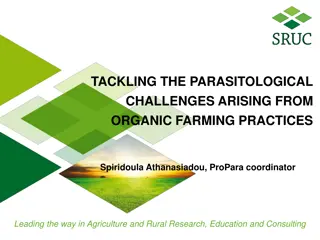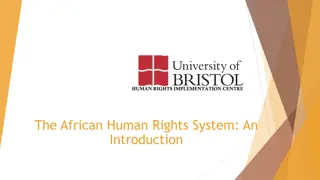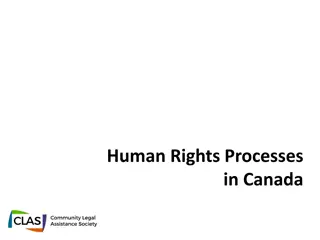Overview of Plasmodium falciparum and Plasmodium vivax Malaria Parasites
Plasmodium falciparum is the most significant malaria parasite, responsible for about 50% of cases, with a short incubation period and distinct morphology in blood smears. It causes severe symptoms and complications, affecting various organs. In contrast, Plasmodium vivax is the most common malaria
2 views • 7 slides
Control Internal Parasites In Animals
Parasite infections of goats can lead to improper digestion, reduced feed intake, weight loss, anemia and even death. Shop our safeguard goat dewormer to keep your goats healthy and parasite-free. Send us an email at sales@hubersanimalhealth.com for
0 views • 2 slides
Understanding Human Rights in Queensland Government Work
The Human Rights Act of 2019 in Queensland outlines protected rights such as equality, freedom of expression, and fair trial. All public service employees must adhere to these rights, ensuring decisions and actions respect human rights. This act applies to everyone in the Queensland Government, with
2 views • 13 slides
Understanding the Basic Concept of Human Rights in Modern Jurisprudence
Human rights are natural and inalienable, essential for human life, based on universal principles. The concept of human rights is both simple and complex, requiring societal development and political will for implementation. Rooted in natural law theory, human rights have evolved from natural law to
1 views • 24 slides
Understanding Ecosystems and Disease Ecology
Explore the diverse types of ecosystems, including autochthonous, anthropurgic, and synanthropic ecosystems, and their impact on disease ecology. Learn about biotopes, biocenosis, ecological mosaics, and ecological interfaces, and discover how infectious diseases can be transmitted across these inte
0 views • 10 slides
Understanding Amphistomosis in Ruminants: Causes, Symptoms, and Diagnosis
Amphistomosis is a disease in ruminants caused by several types of rumen flukes. It leads to productivity losses, weight loss, fertility reduction, and other symptoms. Infection occurs through ingestion of contaminated vegetables and raw meat. The parasite affects the rumen and reticulum of sheep, g
0 views • 8 slides
Understanding Biochemical Mechanisms of Drug Action Against Parasites
Parasitic protozoa cause devastating diseases in humans and animals, and chemotherapy is the primary defense. Drug resistance is a challenge, and prevention is crucial. Modern tools aid in studying genetic and biochemical aspects, targeting the parasite selectively. Drugs act by interfering with spe
1 views • 15 slides
Understanding Synchytrium: Causes and Symptoms in Potatoes
Synchytrium is an obligate parasite causing black wart disease in potatoes. It affects underground parts, leading to cauliflower-like outgrowths on tubers. The fungus exhibits a unicellular structure and releases uniflagellate zoospores for asexual reproduction. Germination of prosorus results in th
0 views • 13 slides
Understanding Media Ecology: Impact of Communication Technology
Media ecology is a theoretical concept analyzing the influence of media and communication technology on human culture. Neil Postman, a prominent figure in the field, delves into how communication media affect human perception, understanding, and values. This study views media as environments shaping
4 views • 23 slides
Understanding Parasitism in Medical Parasitology by Prof. Dr. Ahmed Ali Mohammed
Prof. Dr. Ahmed Ali Mohammed delves into the intriguing world of parasitism, exploring the complex relationships between parasites and hosts. He explains the various types of relationships in parasitology, such as symbiosis, mutualism, commensalism, and parasitism, shedding light on how parasites in
0 views • 23 slides
Understanding Parasitic Relationships in Medical Parasitology
Medical Parasitology delves into the intricate relationships between parasites and their hosts, encompassing symbiosis, mutualism, commensalism, and parasitism. The success of a parasite hinges on achieving a delicate balance with its host, avoiding expulsion or harm. Various types of parasites are
0 views • 12 slides
Understanding Host-Parasite Relationship in Microbiology
In microbiology, the host-parasite relationship is crucial for understanding diseases caused by pathogens. This lecture covers definitions of terms like pathogenicity, pathogen, disease, resistance, susceptibility, infection, virulence, and transmissibility. It also delves into the division of host
0 views • 16 slides
Understanding Malaria: Causes, Symptoms, and Prevention
Malaria is an infectious disease caused by the Plasmodium parasite, transmitted through the bite of a female Anopheles mosquito. There are four types of Plasmodium parasites, with Plasmodium falciparum being the most severe. Malaria incidence globally has seen millions of cases with significant mort
9 views • 14 slides
Comprehensive Overview of Toxocara canis Life Cycle and Characteristics
Toxocara canis, also known as the Arrow-headed worm, is a parasite commonly found in dogs, particularly in puppies less than six months old. This article explores the general characteristics, life cycle, transmission routes, and prenatal infections of Toxocara canis. From the appearance of the male
0 views • 12 slides
Overview of Giardia lamblia Parasite and Giardiasis Disease
Giardia lamblia, also known as Giardia intestinalis, is a flagellated parasitic microorganism that causes giardiasis by colonizing the small intestine. It infects humans, cats, dogs, and birds, and is a common parasitic human disease globally. Giardiasis, popularly known as beaver fever, can lead to
0 views • 12 slides
Understanding Toxoplasmosis: Causes, Transmission, and Hosts
Toxoplasmosis is caused by the Toxoplasma gondii parasite, with cats being the definitive host. The parasite's life cycle involves both sexual and asexual phases, leading to potential infection in humans and other animals. Transmission can occur through contact with cat feces, ingestion of contamina
0 views • 10 slides
Understanding Human Nature and Individual Differences in Foundation of Human Skills
Explore the foundational concepts of human behavior, individual differences, and organizational culture in the study of human skills. Delve into topics such as human nature, personality, attitudes, intelligence, and learning in Prof. Muskan Jeswani's course. Understand the significance of inter- and
0 views • 11 slides
Data Analysis and Experimental Results on Cell Activation, Animal Behavior, and Parasite Infection
The analysis covers research findings on cell activation in T cells, mice weight differences, arachnophobia reactions, cane toad parasite infection rates in different areas of Queensland, and neutrophil responses between KO and WT groups. It includes sample size calculations for statistical power in
0 views • 7 slides
Understanding Parasitic Lifecycles and Evolution in Biology
Explore the intricate world of parasites and their lifecycles, from Protists to Bacteria, understanding how parasitism is a successful survival strategy. Discover the diversity of parasites, their lifecycle complexities, and the importance of multiple hosts in parasite development through examples l
0 views • 6 slides
Understanding Malaria: Causes, Symptoms, and Treatment
Malaria, caused by the Plasmodium parasite and transmitted through the bite of infected mosquitoes, is a major global health concern leading to millions of illnesses and deaths annually. The life cycle of the parasite involves different stages in the human host and the mosquito vector. Effective ant
1 views • 107 slides
Understanding Cyclosporiasis Outbreaks in Georgia: A Comprehensive Overview
Explore the prevalence of Cyclospora outbreaks in Georgia from 2005 to 2015, including historical data, diagnosis methods, demographic insights, and notable past outbreaks linked to foodborne sources. Learn about the parasite Cyclospora cayetanensis, its symptoms, diagnosis challenges, and the cycli
1 views • 21 slides
Entamoeba histolytica: Protozoan Parasite in Digestive Tract
Entamoeba histolytica is a zoonotic protozoan parasite found in the digestive tracts of various hosts. It exists in trophozoite and cyst forms, with trophozoites containing erythrocytes and pseudopodia. The cyst stage is characterized by spherical masses discharged by trophozoites and containing chr
0 views • 17 slides
Evolution of Human Rights: From Ancient Times to Modern Era
Throughout history, ideas of rights and liberty have evolved, leading to the recognition of universal human rights in the modern sense. The concept of human rights can be traced back to significant historical events such as the English Bill of Rights, the Virginia Declaration of 1776, and the French
0 views • 7 slides
Understanding Parasitology: A Comprehensive Overview
Parasitology is the study of parasites, their hosts, and the interactions between them. This field explores the different aspects of parasitism, including the relationships between parasites and hosts, the classification of major parasite groups like protozoa, helminths, and arthropods, and terms cr
0 views • 16 slides
Evaluation of Terminal Sire Breeds for Hair Sheep Production Systems: Year 3 Study
This study evaluates the efficacy of terminal sire breeds in hair sheep production systems to produce high-value market lambs focusing on survivability, growth, and parasite resistance. The research involves purebred Katahdin, Suffolk, and Texel sires, with a particular emphasis on grazing performan
0 views • 27 slides
The Link Between Democracy and Human Rights
The core of democracy lies in promoting equal human worth and self-determination. There is a strong connection between human rights, democracy, good governance, and development. Democracy allows people to participate in decision-making, ensuring their views are heard. It upholds freedom, equality, f
0 views • 15 slides
Understanding the Complexities of Parasite Life Cycles and Host Interactions
Parasites exhibit diverse life cycles and behaviors, with cycles ranging from domestic to sylvatic environments. Factors influencing parasite diseases include host specificity, immunity, and host-parasite interactions. Parasitism can alter host behavior, impacting ecological dynamics. Immunology pla
0 views • 9 slides
The Significance of Human Rights in the Modern World
Human rights are fundamental rights that belong to all individuals, are inalienable, indivisible, interconnected, and should be respected without prejudice. The Universal Declaration of Human Rights, adopted in 1948 after WWII by the United Nations, is a crucial milestone document emphasizing human
0 views • 5 slides
Understanding Apicomplexa: The Intriguing World of Parasitic Protozoa
Apicomplexa, a group of unicellular, spore-forming parasites, exhibit a complex life cycle involving sexual and asexual stages. Coccidia, a type of Apicomplexan parasite, cause diseases like coccidiosis in humans and animals. The disease spreads through contact with infected feces or tissue, leading
0 views • 36 slides
Enhancing Transparency in Human Rights Performance Measurement
This information focuses on initiatives like the Human Rights Measurement Initiative (HRMI) that aim to provide new data for researching and advocating human rights issues globally. The HRMI project, founded in 2015, collaborates with various stakeholders and is funded by philanthropic grants. It em
0 views • 19 slides
Life Cycle of Ascaris lumbricoides in Human Host
Ascaris lumbricoides, commonly known as roundworm, is a human parasite found in the intestine. The life cycle involves copulation, egg development, and infection of a new host through ingestion of eggs. It does not require an intermediate host. The larval stages undergo migration within the body. Th
0 views • 14 slides
Leucocytozoon: Haemoparasite in Birds from Bihar Animal Sciences University
Leucocytozoon, a haemoparasite found in birds, is studied at Bihar Animal Sciences University under Dr. Ajit Kumar. The parasite's morphology, life cycle, and host interactions are detailed, providing valuable insights into its impact on avian health. The research sheds light on the genus Leucocytoz
0 views • 13 slides
Outlines of Legal Theory Human Dignity – Human Rights
Explore the significance of human dignity and human rights within legal theory, reflecting on their cultural, moral, and legal implications. Delve into the essence of human rights as an essential cultural achievement, contrasting the protection and denial of human images within different legal conte
0 views • 10 slides
Innovations in Parasite Control for Organic Farming
ProPara is dedicated to optimizing parasite control strategies for organic farms through targeted research and innovative tools. By generating data, evaluating implementation strategies, and collaborating with key stakeholders, ProPara aims to enhance animal health and welfare in organic farming pra
0 views • 19 slides
Understanding Human Rights: Module 1 Overview
This module serves as an introduction to human rights principles, instruments, and monitoring mechanisms. It covers the definition of human rights, the Universal Declaration on Human Rights, key principles, and state obligations. Human rights are universal legal guarantees that protect individuals a
0 views • 21 slides
International Focus Programme: Human Rights and Technology Advocacy
The International Focus Programme (IFP) is actively engaging in advocating human rights and technology through various initiatives and campaigns. This includes organizing online meetings, webinars, surveys, and events to raise awareness about freedom of expression online, artificial intelligence, an
0 views • 8 slides
Overview of the African Human Rights System
The African Human Rights System encompasses various key elements such as the Organisation of African Unity, African Charter on Human and Peoples' Rights, African Court on Human and Peoples' Rights, African Union, and additional human rights-related treaties and protocols. This system aims to protect
0 views • 19 slides
Human Rights Processes in Canada: Legislation and Protections Explained
Understand the human rights processes in Canada, including the two general sources of human rights, human rights legislation, federal vs. provincial/territorial laws, and the specifics of the BC Human Rights Code. Learn about direct and indirect discrimination, duty to accommodate, and the areas pro
0 views • 12 slides
Impact of Resistance on Parasite Fitness in Quinoline-based Antimalarial Drugs
Resistance cost of fitness studies the impact of drug resistance on pathogens like Plasmodium berghei. Lumefantrine and Piperaquine, used in ACT against malaria, are investigated to understand how resistance affects parasite fitness. The research aims to provide insights into combating drug resistan
0 views • 15 slides
Understanding Giardia: Morphology, Life Cycle, and Pathogenesis
Giardia is a protozoan parasite that causes chronic diarrhea in various hosts, including humans and animals. This parasite has unique morphology with trophozoite and cyst stages. Its life cycle involves direct reproduction through binary fission and transmission through contaminated food or water. G
0 views • 19 slides
